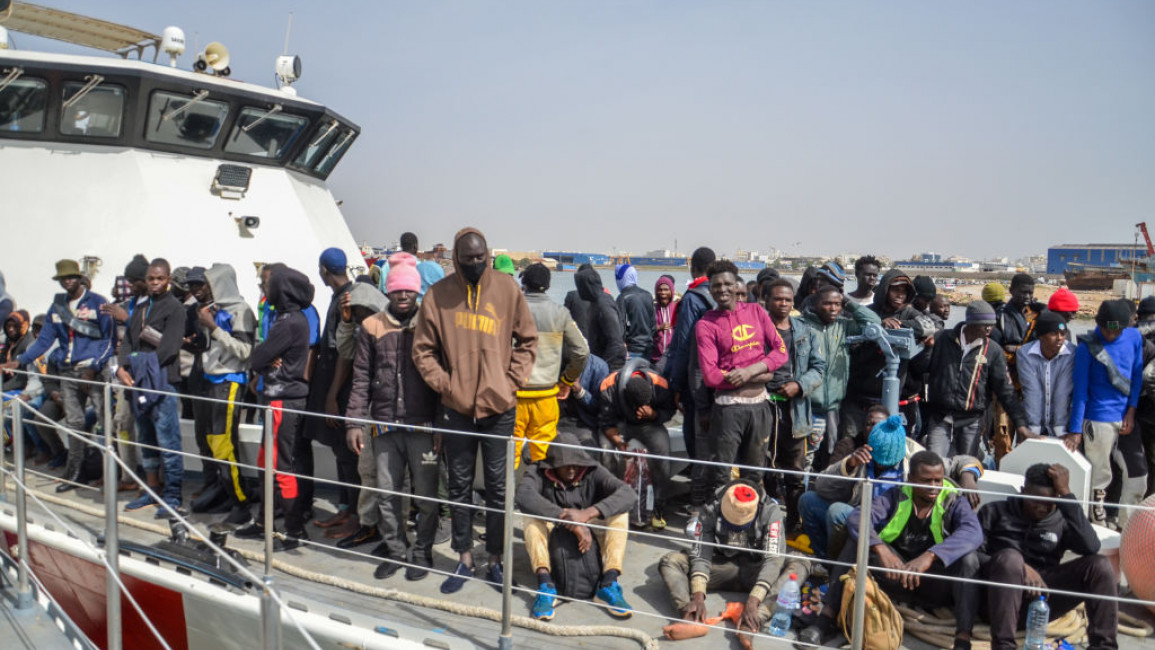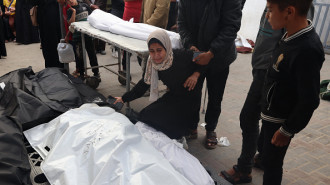Tunisia: Sub-Saharan migrants leave Sfax en masse out of fear of deportation to deadly Libyan desert
After three days of bloody clashes, migrants from sub-Saharan Africa are desperately escaping the city of Sfax to the capital Tunis, hoping to find shelter away from the deportation buses and the nightly attacks.
For the second day, dozens of sub-Saharan migrants are at Sfax station, anxiously awaiting a train departure to Tunis.
They argue that scraping the train ticket price - around US$6- was not easy for most of them, but taking the Tunis train was their last chance to survive.
"We need help; we really need help! We suffer a lot. We have to escape this place to survive," Omar, a migrant from Sierra Leone, said to The New Arab. Omar's name was changed for security reasons, as everyone else's in this report.
Arriving in Tunisia last December, Omar is now ready to flee the country, holding on to what is left of his belongings after angry residents attacked his house in Sfax.
"There are young Tunisians who came to our house to take our money and our telephones. Some with sharp-edged weapons," he said.
On Wednesday, hundreds of migrants were pictured in the train station taking the same road as Omar. Some aim to head to their countries' embassies, a haven from Tunisian forces' deportation buses to the Libyan borders. Others are only thinking about one thing: finding a way to Europe.
"It's really hard. But it seems as the only solution. I cannot spend my whole life escaping Tunisian forces," Abdullah, a Malian migrant, told the TNA.
Pictures from inside the train station in Sfax, where black-skinned migrants are preparing to leave for Tunis, the capital. Due to violence and displacement from homes by force of citizens in Sfax. #TunisiaNotSafe #TunisiaNotSafe pic.twitter.com/kiJJdgeRwH
— Refugees in Tunisia (@RefugeesTunisia) July 5, 2023
Since 3 July, Tunisian forces have reportedly arrested and deported an estimated number of 400 migrants, including children and pregnant women, to the militarised Tunisian-Libyan zone of Ben Gardane.
Migrants in the zone say they had no food or water for over 48 hours.
"Libyan forces handed some cookies and water for the kids, but no food for adults," one activist confirmed to the TNA. Horrific reports on death and sexual assault have yet to be confirmed.
Tunis and Tripoli have yet to comment on the situation.
Meanwhile, the residents of Sfax were seen celebrating the migrants' departure from the city over social media.
"This is an opportunity, and it cannot be compensated since the Ministry of Interior in Sfax is standing with us. Those who have migrant tenants should kick them out in a peaceful way. Keep your home clean, keep Sfax safe," wrote a member of Sayeb Ettrotoir, a Tunisian anti-migration Facebook group.
In central-eastern Tunisia, Sfax is the departure point for many migrant boat crossings to Italy. In the popular city neighbourhoods where most migrants live, verbal and physical violence is frequent between the two parties.
Over the past few days, clashes between residents and migrants escalated after three sub-Saharan migrants stabbed to death a Tunisian man, according to the spokesman for the Sfax prosecution Faouzi Masmoudi.
Local NGOs say the recent tensions were "expected" after President Kais Saied's infamous anti-migrant speech. On 21 February, President Saied claimed that Sub-Saharan migration to Tunisian is "organised crime" that threatens to change the country's demographic makeup.
"We warned against the tragic and inhuman situation of migrants aggravated by hate speech against them, which explains this violence," Romdane Ben Amor, head of the Forum for Economic and Social Rights (FTDES), told the TNA.
Thirty International and local NGOs released Wednesday a communiqué condemning the human rights violations against sub-Saharan migrants while calling for urgent intervention "to put an end to these arbitrary and illegal refoulement operations in the Libya border."

![A case related to Palestinian academic freedom is argued in US federal court. [Brooke Anderson/TNA]](/sites/default/files/styles/image_330x185/public/2024-05/IMG_1405.jpg?h=71976bb4&itok=y0zgklKx)

